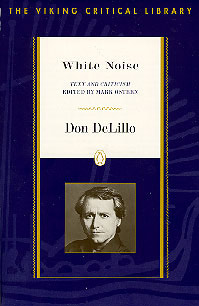
This is the first novel I have read by Don Delillo. I didn't really know what to expect but I was anticipating a challenging read and a potentially unpleasant, depressing story with some heavy-handed satire of modern society (television, shopping malls, adultery, etc.). I was surprised at how funny it actually was, and how genuine
There is satire of academic and family life but it is not nearly as shallow or malicious as I assumed when I read in a book summary that the main character is head of the department of Hitler studies and on his fifth marriage. I was bracing for a series of unlikeable characters engaging in petty selfishness and an exaggeration of the emptiness of middle class existence. Instead I found the family relationships were actually rather touching. The love and inclusiveness of the bonds formed in the blended family, the overactive concern of the children for their parent's health (informed by media reports of what is and is not healthy, like sugar-free gum), the married couple's pre-coital dialogue in which each is more concerned with accommodating for the pleasure of the other than in their own pleasure, a parent's wonder in observing the type of person their child is growing up to be, or simply the unconditional love manifest in observing your sleeping child. None of the cynicism I had anticipated.
The characters weren't very real, however. They had personalities but they didn't develop much over the course of the novel and there was a tendency for dialogue to slip from the character's voice into the voice of Delillo trying to make some grander point and using their dialogue to do it. As a result various characters would at different times adopt this very similar didactic style, parsing their subject through question and answer and trying to break it down for us. Delillo is obviously after deeper truths than realistic small talk between his characters, and many of the digressions are rather interesting and insightful. These conversations are used to delve deeper into topics of family, technology, information, media, consumerism and intellectualism which are explored throughout the novel.
White Noise is about the way information permeates our society, both figuratively (in the sense of constant exposure to media, advertising, cultural information) and literally (in the form of television and radio waves that are all around us and even traveling through us at all times). The way we are the sum total of our data (medical files, marketing demographics, tastes and preferences, taxonomical groupings). The nature and integrity of this data, if it is reliable, and if truth even matters or if false information affects us just the same. And the way academic parsing of this data can become infinitely digressive and absurd.
The book is also about death, circling this theme closer and closer as it progresses. Personally, I prefer the first part of the novel where it was more light--hearted and observational. Delillo packs the novel with detailed observations about contemporary American life, human behavior, and even the form and function of household appliances that all serve to reinforce the above-noted themes. As we progress through the story death and fear of death begin to dominate the conversations, actions, and musings of everyone in the story. Where it was fun to read scenes in which a group of American Studies professors sit around discussing where they were and what they were doing when various pop-culture icons died (a not-so-subtle competition emerging as they try to stump each other or compete to name more obscure celebrity deaths that left such an impression "Ask me Gable, ask me Monroe.") it grows weary when chapter after chapter gets devoted to contemplating the idea of death, what it says about life, and what it says about humans that our defining characteristic is that we alone know we are going to eventually die and are able to imagine it, etc.
Overall, I enjoyed White Noise. It isn't something I would not emphatically recommend to everyone but if it sounds appealing to you than I think it's worth your time. It is very well-written and packed with ideas. I can already feel this review extending on and on as I try to cram in as many of my reactions and observations in as possible. I could keep going but I don't want this to turn into a term paper or give too much away. Besides, there is already a wealth of criticism and analysis out there about White Noise and Delillo's work, he's one of the Big Dogs of late 20th century American literature. On the strength of this novel I plan to read more Delillo in the future. Maybe Mao II and I definitely want to read Underworld (although at 800+ pages probably not this year).

No comments:
Post a Comment